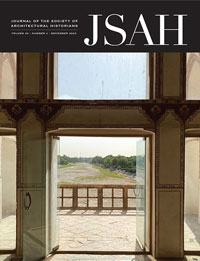An SAH-sponsored session will take place at the College Art Association's 102nd Annual Conference in Chicago.
SAH is sponsoring a session at the College Art Association's 2014 Annual Conference in Chicago. "
Framing Public Interest Architecture: Changing Notions of Public, Practice, and Profession," chaired by SAH member Farhan S. Karim of the University of Kansas, takes place at the Hilton Chicago from 12:30-2:00 p.m. on February 13, 2014.
Paper Topics The Public Good of Architecture: Who Is the Public and What Is Its Good?
Tom Spector, Oklahoma State University
PID: The Unfinished Project of Modern Architecture
Jorge Francisco Liernur, Universidad Torcuato Di Tella
Architecture, Gender Justice, and the Politics of Empowerment
Adnan Zillur Morshed, The Catholic University of America
Dew Points
M. Ijlal Muzaffar, Rhode Island School of Design
Session Description Since the last few decades, a substantial number of architects have been working to redefine architecture from a market driven profession to a complex mix of praxis, altruism, and activism that intends to eradicate poverty, resolve social exclusion, and construct an egalitarian global society. This emerging practice, broadly known as the public interest architecture, engages other professionals in the design process to have extra disciplinary perspectives, and thus argues for a collective and interdisciplinary method of design. This idea of professional collectivism defies the conventional dyad of architect-commissioner, and is mainly concerned of the ‘interest of public’ instead of satisfying the idiosyncratic demand of individual clients. The apparent pragmatic motivation behind this new approach, as many would argue, is underpinned by a social utopia that the negative effect of social exclusion and marginalization could be minimized by spatial articulation through design, planning and management. In a way, architecture is mediated to strike a fine balance between immediate pragmatism and unattainable utopia. This shift in architectural modality does not only question the linear and normative perception of social exclusion but also identifies the causes of those as embedded in ecological imbalance, and unsustainable topographical change due to unrestrained growth of consumerism and neoliberal economy. In such view, architecture mediates between the problems of ecology, social inequity, and unsustainable spatial articulation.
In this panel, critical analysis of different case studies and theoretical perspectives shall provide a framework to understand the impact of this emerging architectural culture. Furthermore, this panel focuses on public interest architecture’s relationship with the two fundamental concepts,
'social participation or engagement' and 'collective well being.’ Papers may discuss how these two concepts have been shaped by the economic austerity, the changing notion of ‘public’ and alternative routes to consumerism. Relevant questions might include: To what extent the new architecture empowers the participants to act, or does this transform them into active social agents? When we address marginality in design process how relevant it is to take into account the actual production of social exclusion? Has the discourse of aesthetic and principles of form and geometry, been made secondary if not marginal and overshadowed by the social commitment of the practice? Where to make the disciplinary boundary and autonomy? Or are there any?
More Information
For more information on the CAA Annual Conference, visit
collegeart.org.


